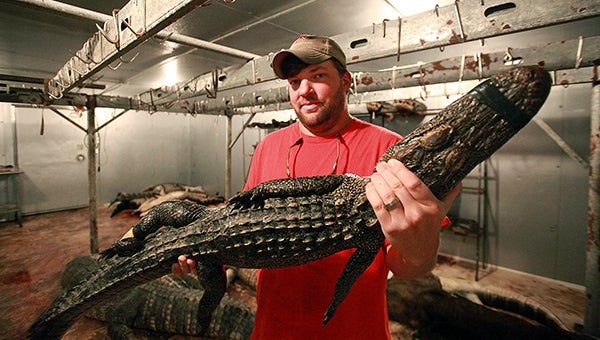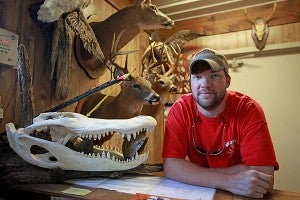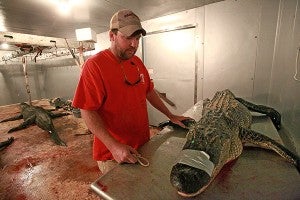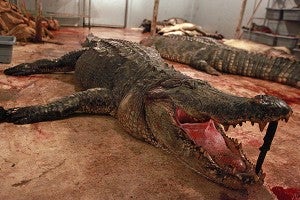Alligator business is good for state’s only buyer
Published 11:55 am Monday, September 8, 2014

Owner Danny Boler holds up one of many alligators stored in his large walk-in freezer Saturday at B&L Meat Processing. Boler buys, sells, mounts and processes alligators. (Justin Sellers/The Vicksburg Post)
Mississippi’s public waters alligator season comes to a close at noon today, but for Mississippi’s only resident in-state buyer, his work is still in full swing.
B&L Meat Processing owner Danny Boler, who also happens to be Vicksburg’s only alligator meat processor, has been hard at work since the season opened August 29 and still has a freezer full of gators to get to. This is only his second year working in the alligator market, but it’s given his business a boost during what was previously a slower time of the year.
“Last year I decided I wanted to expand a little bit,” Boler said. “I started processing and skinning, and this year I decided I wanted to start buying since there’s not a buyer in the state.”
Although skinning and processing an alligator isn’t that much different than any other animal, he had to learn the basics before he could cut into his first one.
“It was new to me last year, I had to learn everything, Boler said. “I had to learn how to skin them, where to cut them and where not to cut them.”
Along with meat processing, he is also the only resident buyer of alligators in the state of Mississippi. Boler buys mostly from hunters in west central and southwest Mississippi, and attributes his success to Vicksburg’s proximity to those regions.

Owner Danny Boler holds up one of many alligators stored in his large walk-in freezer Saturday at B&L Meat Processing. Boler buys, sells, mounts and processes alligators. (Justin Sellers/The Vicksburg Post)

Owner Danny Boler talks about processing alligators in his large walk-in freezer Saturday at B&L Meat Processing. Boler buys, sells, mounts and processes alligators. (Justin Sellers/The Vicksburg Post)

An alligator weighing more than 700 pounds lays Saturday on the floor of the walk-in freezer at B&L Meat Processing. Boler buys, sells, mounts and processes alligators. (Justin Sellers/The Vicksburg Post)
“We’re dead in between both regions, it’s very convenient,” he said. “It’s an easy out for the hunters.”
Boler, who is a self-described “middle man,” buys whole alligators or just their hides, and then ships them to buyers in south Louisiana. At that point those hides may become purses, jackets, or a new pair of shoes, depending on what the demand is.
Boler has had steady business, receiving about 100 alligators this year, but hopes to grow even more in the coming years. The volume of his business depends heavily on what time of the year it is, and this gives him something to do before deer season gets in full swing and he’s working sixteen-hour days.
“It makes me have a year-round job,” Boler said. “I go from taxidermy to alligator processing to deer processing, then start over.”
Once deer season ends he’ll begin his taxidermy work, mounting deer, fish, alligator heads, and anything else that customers want as a lasting memory of their hunt.
Although the concept of processing an alligator for meat or taxidermy is similar to other animals, the sheer size of most of the reptiles is what’s difficult. With Mississippi’s newest state record holder weighing in at a massive 792 pounds, even a medium-sized alligator can be too much for one man.
“They’re hard to do anything with, it’s not like dragging a deer through the door,” Boler said. “He’s a dinosaur.”





